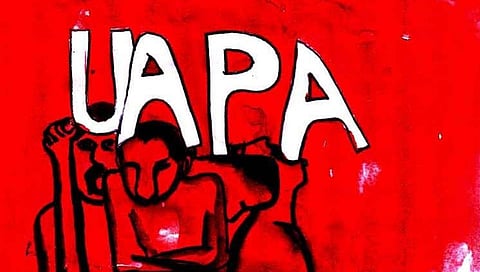

THE United Nations Special Rapporteurs, in a communication dated May 06, 2020, wrote to the Indian government, raising their concerns regarding the Unlawful Activities (Prevention) Act, 2019 (UAPA 2019). The letter details the non-compliance of the set international standards of counter-terrorism legislation by the UAPA, 2019 legislation. It also expresses concern over the several violations of the international human rights obligations of India through the UAPA, 2019.
The statement details the problematic contents of the UAPA 2019 along with the comments from the Special Rapporteur on the promotion and protection of human rights and fundamental freedoms while countering terrorism; Working Group on arbitrary detention; Special Rapporteur on the promotion and protection of the right to freedom of opinion and expression; Special Rapporteur on the rights to freedom of peaceful assemble and of association; Special Rapporteur on the situation of human rights defenders; Special Rapporteur on the independence of judges and lawyers; Special Rapporteur on minority issues; Special Rapporteur on the right of privacy and Special Rapporteur on the freedom of religion and belief.
The statement particularly questions the problematic designation of individuals as "terrorists". The report mentions the ongoing situation in India that demonstrates discrimination directed at religious and other minorities, human rights defenders and political dissidents, against whom the UAPA, 2019 has primarily been used. Naturally, these activities violate the international law commitments of India absolutely and hence, the statement urges the government of India to review the provisions of the amended UAPA, 2019. The Statement mentions that the amended UAPA, 2019, contravenes several articles of the Universal Declaration of Human Rights and the International Covenant of Civil and Political Rights. Further, the Statement also reminds the Indian government about the several resolutions of the United Nations Security Council that obligate nations to make legislations against terrorism and extremism without the breach of their international law obligations.
The Statement further raises its concern about the latest amendments to the law that allow the transfer of broad and increased power to the government authorities to investigate, seize property and designate individuals responsible for acts that are "likely to threaten" or likely to strike terror in people. Further, the statement voices the irregularity of the UAPA, 2019 as it reverses the burden of proof on the accused. This creates a big dent on justice on the right of the accused to be presumed innocent until proven guilty and hence obstruct due process in the absence of a fair trial. UAPA, 2019, enables the police to keep an accused under custody for up to 180 days without any charge against her, for the purposes of investigation. Clearly, the Act is a manifest violation of the principles of reasonableness, necessity and proportionality.
The amended Act allows for searches, seizures and arrests based on the "personal knowledge" of police officers without a written validation from a superior judicial authority. The police are empowered by the amendments to enter the premises on a person on the mere suspicion of her being part of an "unlawful association". The police have the power to examiner the books, and other properties of the accused and also make enquiries against her. This, the statement declares, is a clear violation to the right to privacy as per India's international law obligations.
On the basis of these observations, the Statement declares grave concern towards the UAPA, 2019. The statement strongly urges the government to review the provisions of the amended act and to declare them inconsistent with the necessary set standards of human rights obligations under international law.
The UAPA, 2019, has recently been used to jail several human rights defenders in the country. One of the most prominent of these cases was the arrest of the 1l human rights activists known for their vocal dissent and work for people's rights as lawyers, journalists and academics. Due to the arbitrary provisions of the UAPA, they remain in jail without a trial. While the UAPA shifts the burden of proof on the accused, bail also becomes an incredibly stiff possibility. Several questions have also been raised against the arbitrary procedures that were followed in the case. The lack of transparency in the case reek a sense of political vendetta. Even during the Covid-19 crisis, when the virus has spread within Indian jails and bail is being preferred for most inmates to ensure safety, these activists remain in custody. They are all middle-aged people while some of them are senior citizens.
Another Muslim student and activist, Safoora Zargar, was also arrested during the Covid-19 lockdown in Delhi, under the UAPA 19. Saffora is pregnant. She was particularly active in the peaceful protests against the CAA. After several hours of interrogation, Safoora was arrested despite the aggravated risk towards her infection of the virus while she is pregnant.
Under the circumstances, while the UAPA, 2019, is becoming an instrument of silencing dissent in India, the United Nations Statement comes as a very strong assertion from the international community. It is a reminder to the Indian government to nourish the spirit of dissent in the Indian democracy and comply with the set standards of the Indian Constitution and international law.
Read the complete statement here.